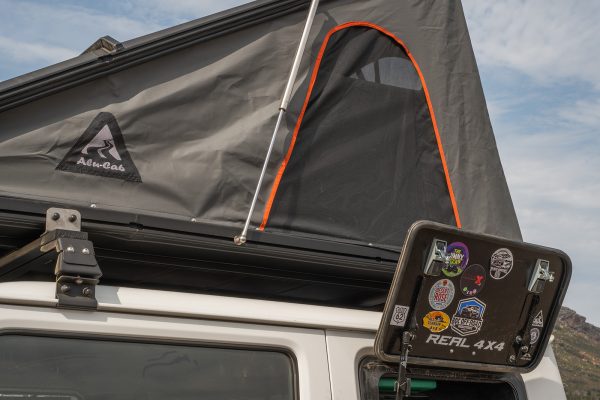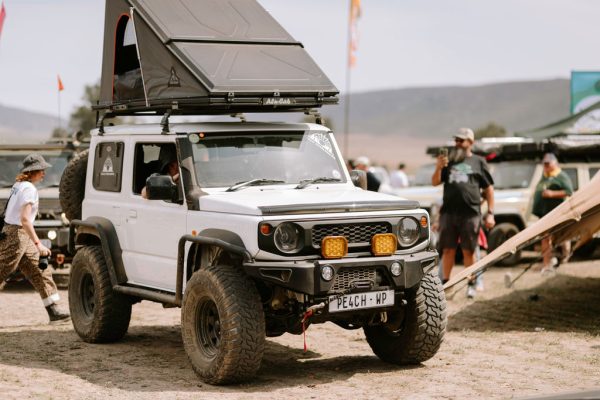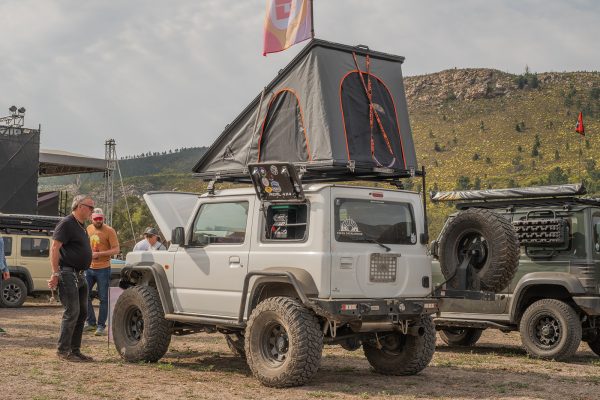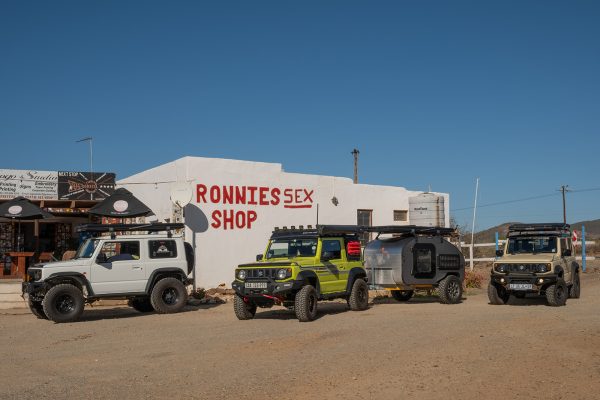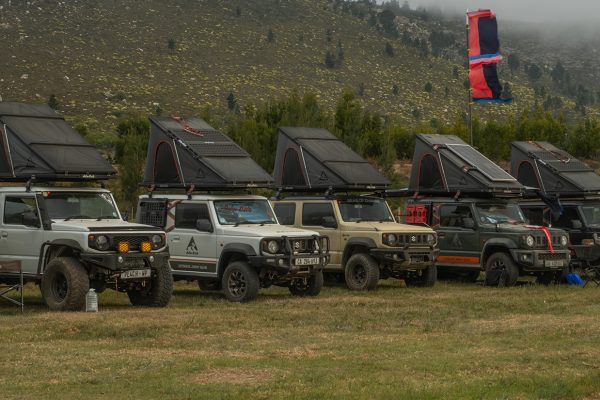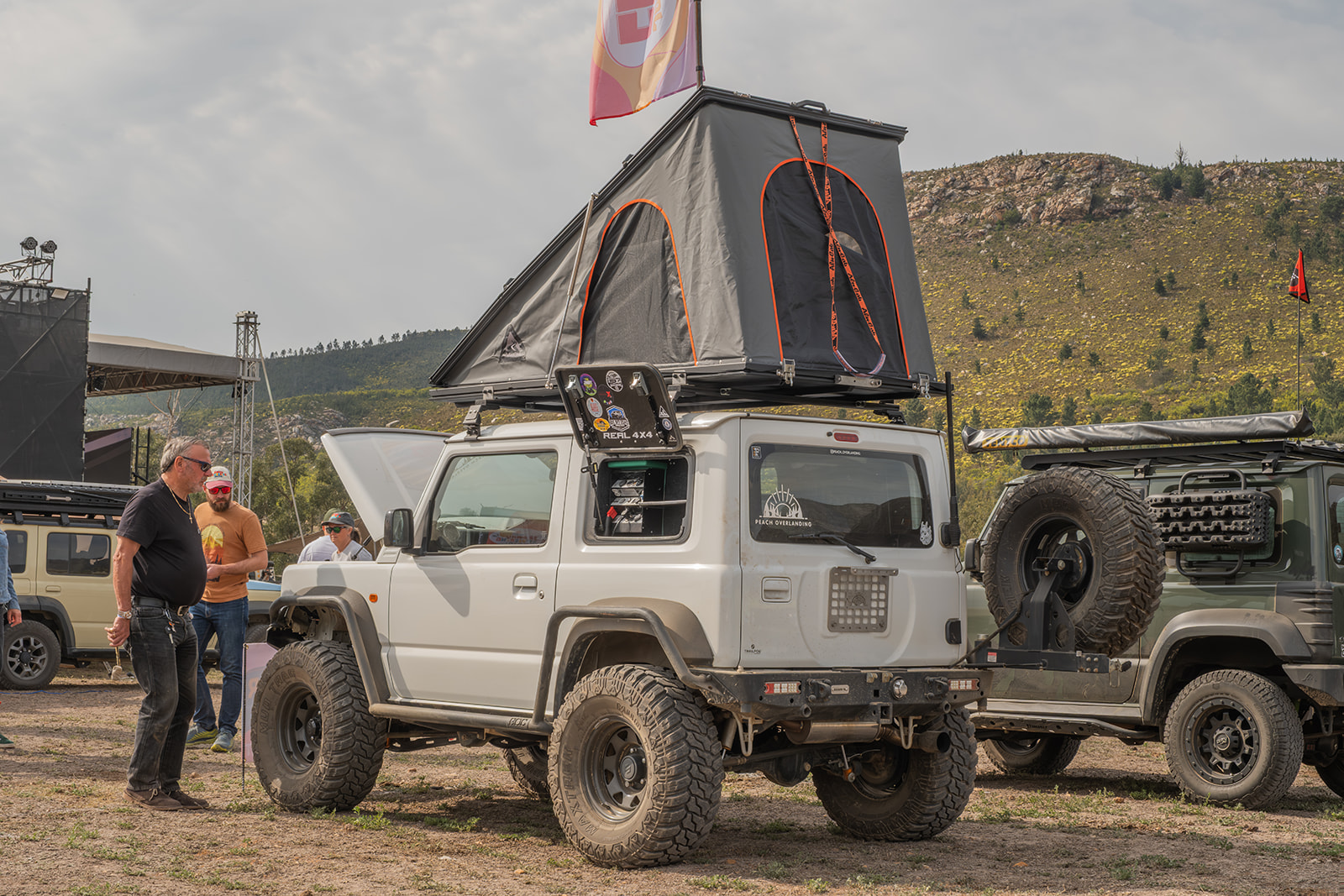
Photo credit: @unarchived_images
Introduction – Finding the Right Tent for a Small Rig
After testing several rooftop tents — Frontrunner, RoofPod, and a few others — I finally landed on what I think is the best setup for a smaller overlanding rig: the Alu-Cab LT50.
The Jimny doesn’t have the roof space or payload of a Defender or Land Cruiser, so keeping things lightweight and compact is crucial. The LT50 ticked all my boxes — sleek, easy to use, fits in my garage, and made by a brand known for top-tier quality.
This review runs through my personal experience with the LT50, the pros and cons, and how it compares to the RoofPod and other lightweight hard-shell tents I’ve used.
1. Alu-Cab LT50 Specs & Key Details
| Specification | Details |
|---|---|
| Weight (tent only) | 46 kg |
| Total weight (with mattress & ladder) | ± 50 kg |
| Closed dimensions | 1261 mm (W) × 2258 mm (L) × 172 mm (H) |
| Mattress | 60 mm high-density foam, removable cover |
| Interior mattress size | 1085 mm (W) × 2070 mm (L) |
| Construction | Full aluminium shell with dual-layer 280 gsm UV-resistant canvas |
| Load rating (roof load on tent) | ± 30 kg (solar panels, gear, etc.) |
| Access | Dual-entry with side doors and top gas-assist lift |
| Extras / options | Ladder extensions, rainfly, MOLLE top plate, load bars |
| Recommended max speed | ~120 km/h (typical RTT guideline) |
(Source: alu-cab.com,
trailpod.co.za)
2. Setup, Mounting, and First Impressions
The LT50 arrived as one of the easiest rooftop tents I’ve ever mounted. We had to make a few minor adjustments — tightening the gas struts and fine-tuning some clips — but nothing unusual for a new tent.
One thing to note is ladder length. The standard 2 m ladder was too short, especially with my lifted Jimny on 33s. We swapped to the 2.6 m ladder, which fits perfectly and makes entry much easier.
I also went with Alu-Cab’s load bars and gutter-mount feet, but honestly, they sit too tall for the Jimny. I’ll probably swap to Front Runner feet or custom brackets to drop the profile — purely an aesthetic thing, but the height looks odd on such a small rig.
3. Comfort & Living With It
Inside, the mattress is solid — firm but comfortable, with enough foam thickness for a good night’s sleep. You can leave your duvet or sleeping bag inside when closing the tent, but not pillows.
Space-wise, it’s ideal for one or two people (and maybe a small dog). If you’re over six feet or don’t like sharing close quarters, it might feel tight.
What really impressed me was how easy it is to live with day-to-day:
- It fits in my garage without removing it.
- It’s weatherproof, secure, and looks neat on the car.
- The streamlined aluminium shell means far less drag and noise than soft-shell tents.
4. On-Road Performance
Compared to other tents I’ve run, the LT50 feels aerodynamic and well balanced. With the Jimny’s small motor, you immediately notice anything that kills speed or fuel economy — and the LT50’s narrow profile helps a lot.
Yes, there’s a slight whistle at certain speeds or wind angles, likely from the front extrusion channels. My plan is to make small rubber plugs or add a light bar to break the airflow. Otherwise, it’s quiet, stable, and doesn’t make the Jimny feel top-heavy.
5. LT50 vs RoofPod and Other RTTs
| Feature | Alu-Cab LT50 | RoofPod | Frontrunner / Other Soft-Shells |
|---|---|---|---|
| Weight | ~46 kg | ~60–65 kg (varies) | 45–70 kg |
| Material | Aluminium hard shell | Aluminium hard shell | Canvas or soft shell |
| Setup Time | 1–2 min | 2–3 min | 5–10 min |
| Height / Profile | Slim, low drag | Taller, bulkier | Bulky, high drag |
| Comfort | Good mattress, moderate space | Slightly taller interior | More space, less convenience |
| Looks | Clean, modern | More utilitarian | Varies |
| Noise / Wind Resistance | Very low | Slightly higher | High |
| Ideal Vehicle | Compact rigs (Jimny, small SUVs) | Medium SUVs, Defenders | Large 4x4s / trailers |
The RoofPod remains a fantastic tent — I genuinely liked it — but for me, the LT50 just looked and fit better on the Jimny. It’s narrower, more aerodynamic, and feels purpose-built for small 4x4s where every kilo matters.
6. Pros & Cons
Pros:
- Lightweight for a hard shell (± 46 kg).
- Slim, aerodynamic design — perfect for smaller vehicles.
- High build quality (Alu-Cab’s standard).
- Easy to set up and pack down.
- Solid weatherproofing and ventilation.
- Fits in a garage without removal.
Cons:
- Original 2 m ladder too short — replaced with 2.6 m.
- Slight wind whistle at some speeds.
- Short interior length for tall users.
- Gutter-mount feet too tall for small rigs.
7. Final Thoughts – Lightweight Done Right
After owning swags, soft-shells, and even trailer setups, the LT50 hits the sweet spot. It’s lightweight, looks clean, sets up in seconds, and has none of the usual rooftop-tent hassles.
It’s not the cheapest or biggest option out there, but if you want a high-quality, compact, and versatile tent, the Alu-Cab LT50 is one of the best you can buy right now.
It’s perfect for smaller overlanding rigs like the Jimny, yet still flexible enough to move to a bigger touring build later. I’m keeping mine — and probably won’t change tents until I outgrow the car itself.
Recent Posts
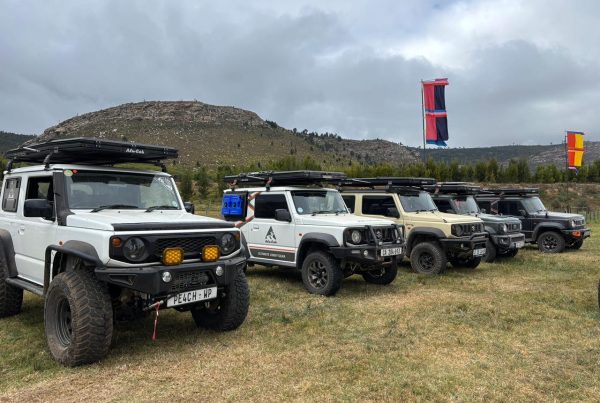 RATEL Long Range Fuel Tank Review – First Trip Impressions on My Jimny
RATEL Long Range Fuel Tank Review – First Trip Impressions on My Jimny
RATEL Long Range Fuel Tank Review – First Trip Impressions on My Jimny
 Upgrading to the Gobi-X Rear Bumper for Your Suzuki Jimny
Upgrading to the Gobi-X Rear Bumper for Your Suzuki Jimny
Upgrading to the Gobi-X Rear Bumper for Your Suzuki Jimny
 Runva 4500lbs Winch Setup for My Jimny JB74
Runva 4500lbs Winch Setup for My Jimny JB74
Runva 4500lbs Winch Setup for My Jimny JB74
 Introducing the Peach Overlanding Online Store
Introducing the Peach Overlanding Online Store
Introducing the Peach Overlanding Online Store
 Roar-X Bear-X 7-Inch Spotlights Review
Roar-X Bear-X 7-Inch Spotlights Review
Roar-X Bear-X 7-Inch Spotlights Review
 The Roofpod Solopod Review
The Roofpod Solopod Review
